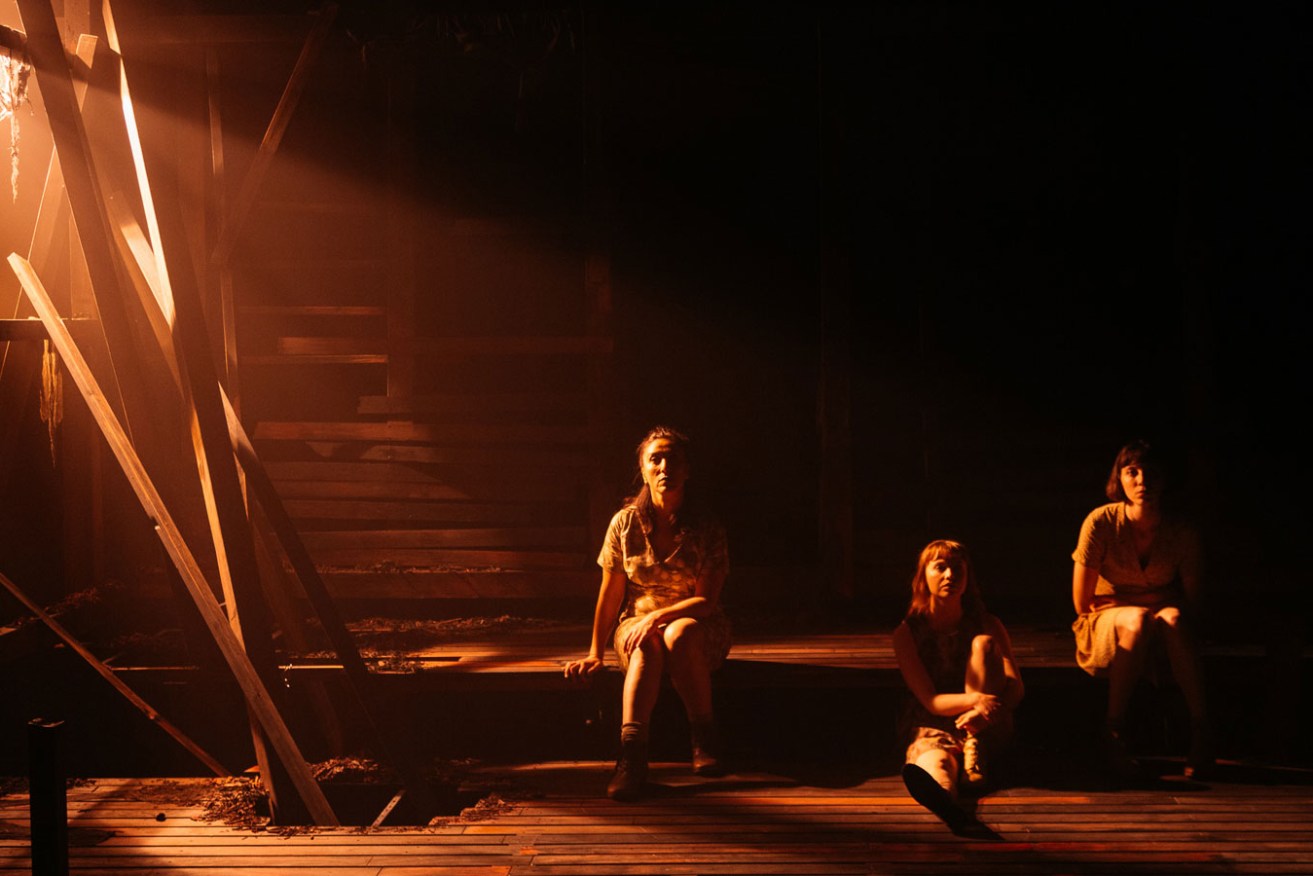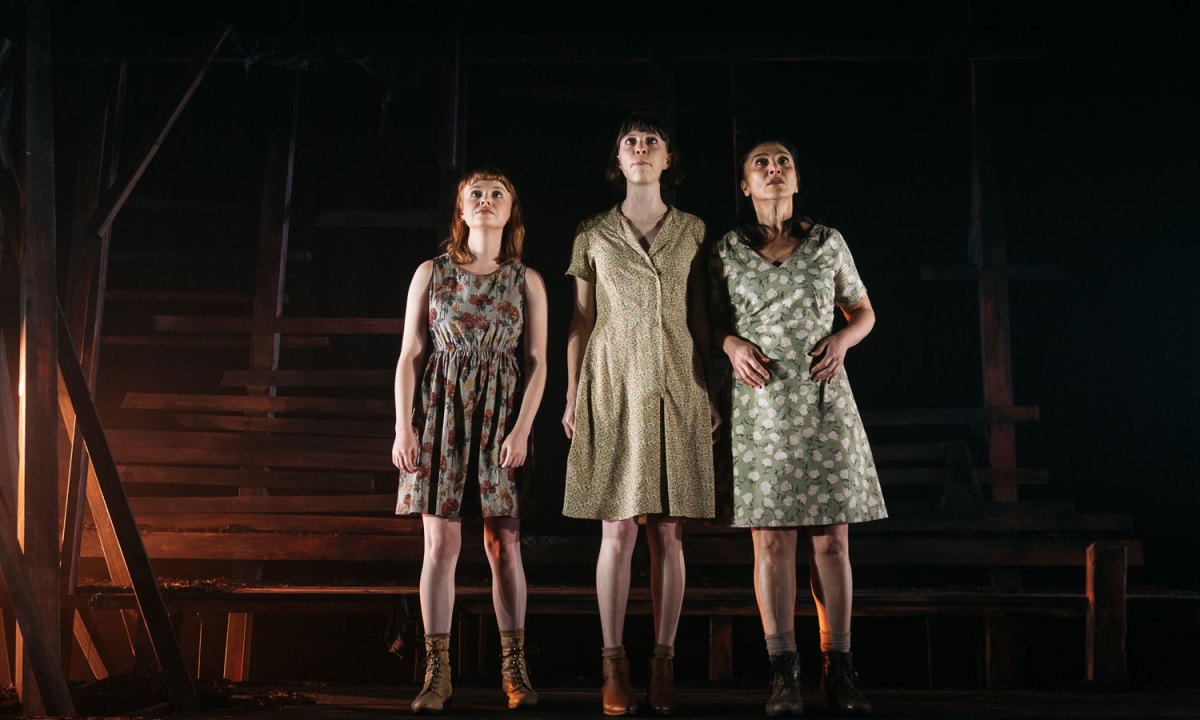With a crack in the night, The Bleeding Tree returns
Award-winning gothic thriller The Bleeding Tree is being brought back to the Adelaide stage this month – and with its gritty themes of power, abuse and revenge, director Corey McMahon says it’s a play that still has plenty to say.

The set and lighting add to the gothic atmosphere of 'The Bleeding Tree'. Photo: Thomas McCammon
Corey McMahon felt like there was unfinished business after Theatre Republic’s first season of Australian playwright Angus Cerini’s The Bleeding Tree wrapped up in December 2020. The local company had already been forced to reschedule the play from earlier in the year due to the first wave of COVID, and when it did finally get to the stage at Tandanya, the show was impacted by the state-wide four-day lockdown and a density cap on audience numbers.
“We were literally turning people away. We sold out, and that’s a great thing, but we sold out to only half the theatre… it was a challenging time for everyone.”
McMahon, artistic director of Theatre Republic and director of its production of The Bleeding Tree, wanted to bring the play back to the stage so more people would have an opportunity to see it. In the intervening time, he notes, real-life events relating to the abuse and control of women have echoed some of the strong themes in the fictional story.

Corey McMahon. Photo: Thomas McCammon
The Bleeding Tree is described as a “roaring rampage of revenge” that sees a mother and her two daughters in a rural community welcome home their abusive husband and father “with a crack on the shins and a bullet in the neck”.
“As the play progresses we discover that most of the community actually knew what was going on but they just chose not to get involved until they’d learnt that the women had taken care of business,” McMahon says.
“Elena Carapetis’s character, the mother, calls them out in terms of their complicity and their cowardice at the end of the play. So it felt to me like despite the fact the play was written in 2015, unfortunately it still has a real relevance to what’s happening in the world, the conversations that we’re having… I just felt that this play still had something to say to audiences.”
The remounted production will be presented over four nights in the Adelaide Festival Centre’s Space Theatre and performed by the original cast, with Carapetis joined by Miranda Daughtry and Annabel Matheson.
McMahon – who headed into rehearsals soon after returning from a New Zealand tour of Girl From the North Country, of which he is associate director – acknowledges that The Bleeding Tree is “not a whodunit by any stretch of the imagination”. Rather, the story backtracks from the opening incident to explore what led to the women’s act of revenge and what happens in the aftermath, with members of the community turning up to their home.
“Angus Cerini is really not afraid to push forward and basically challenge the audience – challenge us, the community – and ask some tough questions in terms of how complicit we are in turning a bit of a blind eye to domestic violence.”

Annabel Matheson. Elena Carapetis and Miranda Daughtry reprise their original roles in Theatre Republic’s remount of The Bleeding Tree. Photo: Thomas McCammon
The Bleeding Tree takes place in a broken-down house, with designer Victoria Lamb creating a set that McMahon says reflects what’s been happening to the female characters. The sense of decay and Australian gothic aesthetic is emphasised by Chris Petridis’s lighting, which captures “the heat and the desolation and arid nature of a rural community or an outback town”.
“He’s also lighting from the side, so it means the lighting is cutting across the actors and they’re moving in and out of shadows and I think that really amplifies the whole tone of the work… we’ve always likened the set to being almost like a fourth character in a way – it’s such a powerful and evocative structure.”
Amid the complexity and brutality of Cerini’s script, there is also macabre humour. It is a challenging text for actors, McMahon says, because it is like one long poem. However, with the aesthetic and back-story of the play established in the first season, the cast members have been able to delve deeper into their characters for the remounted season.
Carapetis says that stepping back into The Bleeding Tree is “incredibly exciting”: “Last time we staged this play it felt like we started a really important conversation with audiences. As women’s bodies all over the globe continue to be sites of violence and control, it feels vital to bring this story back and to have audiences reckon with the lives of these women.”
Theatre Republic – which was established in 2018 by McMahon and company manager Manda Flett – aims to provoke and surprise with its productions. And while McMahon says he’s not under any illusion that “a theatre performance presented by a small company in Adelaide is going to somehow change the world”, the first season of The Bleeding Tree did have a profound impact on many audience members.
“If we can change the perspective of one or two people in the audience, and they go out and they share that changed perspective, then I think it’s mission accomplished for us.”
Theatre Republic will present The Bleeding Tree at the Space Theatre from August 24-27.




